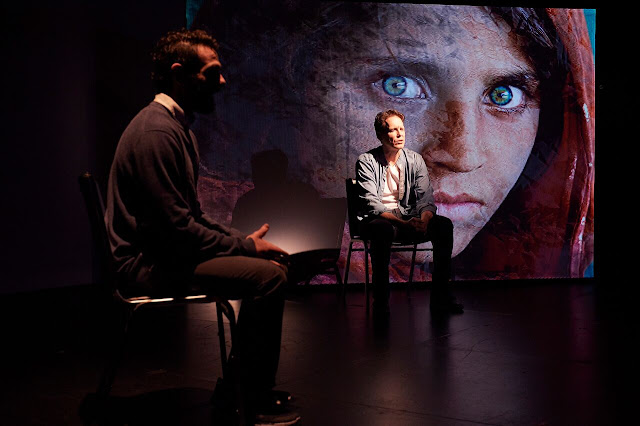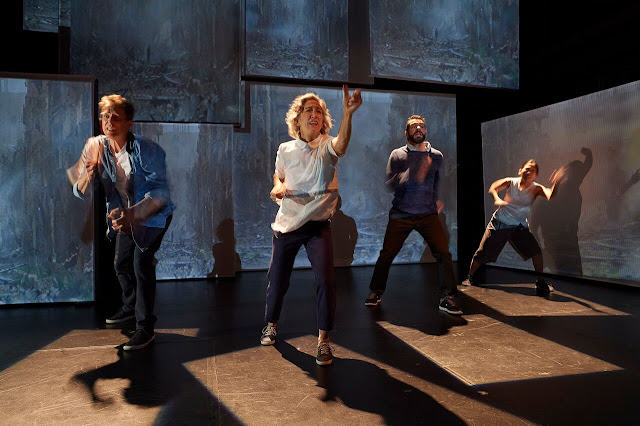REFLECTOR
"TIME'S RELENTLESS MELT"
PRODUCTION PHOTOGRAPHS BY MICHAEL COOPER
“to take a photograph is to participate in another person's mortality, vulnerability, mutability. Precisely by slicing out this moment and freezing it, all photographs testify to time's relentless melt.”
“To suffer is one thing; another thing is living with the photographed images of suffering, which does not necessarily strengthen conscience and the ability to be compassionate. It can also corrupt them. Once one has seen such images, one has started down the road of seeing more - and more. Images transfix. Images anesthetize.”
_______________________________________________________
Gargantua’s signature physicality, integrating elaborate choreography into the action, varies the program with intense moments that respond to the violence of the background image, and yet the integration, unlike other Gargantua productions, does not meld into the action and the text as seamlessly as it might have. There are notable exceptions when intricate hand and body movements take photographs being represented on a series of illuminated hand held devices and turn them into a somewhat harrowing, relentless, and very effective representation of the use of the image as it inundates the senses and ultimately cannot be avoided - or fully comprehended - by the human eye.
The four character ensemble takes on the physical and vocal challenges with great skill with a standout performance by Michelle Polak as a woman tackling her exceptional yet frequently problematic ability to remember absolutely everything she experiences. She becomes a distressing yet engaging counterpart to the camera itself as her persona becomes entrapped within a reservoir of even the smallest, relatively insignificant details of her daily life.
Michael Spence as the photographer suffering from his exposure to his own photograph of a war-torn street, and a lone inhabitant, delivers a profoundly moving monologue that dissipates a little through a cliched ending, yet brings the overall piece to a sobering conclusion. There is no resolution, there are only photographs, and memories, and neither has the capacity to tell the full story.
Louisa Zhu brings a fine intriguing & interrogating light to the photographers gaze as she presents a character in search of the man who created the image, while Abraham Asto gives a very effective and finely measured performance as a therapist in search of a way of aiding the beleaguered individuals who have found memory and images from the near and distant past to be complicated, problematic human phenomena to be tackled and resolved on a daily basis.
Gargantua’s 25th anniversary production was inspired by the global response to the photograph of the drowned Syrian child whose image had a profound impact upon the plight of war and the people most tragically affected by it -
“Although we had initially been prepared to embark on a completely different project, this remarkable incident two years ago inspired us to change our course and instead explore the extraordinary power of images and how and why they can affect us in the profound way that they do.”
Jacquie P.A. Thomas & Michael Spence
Thomas’s direction and Spence’s script work together well as artists instinctively aware of how to create text, image, sound (Thomas Ryder Payne) and lighting (Laird MacDonald) that seamlessly address complex social, political, and aesthetic issues that create a kind of history based physical theatre - always engaging and always thought-provoking.
Although there are times when the opacity and inconclusive nature of the script may appear to be a flaw in this production, one may choose to see the ultimate product as a reflection of the very opacity and inconclusiveness of a photograph - as it may attempt to reveal everything and yet, in the end, say very little about what we are able to do - in the face of human conflict - in order to stop the atrocities that some photographs record.
REFLECTOR RUNS AT
THEATRE PASSE MURAILLE
UNTIL NOVEMBER 18








No comments:
Post a Comment